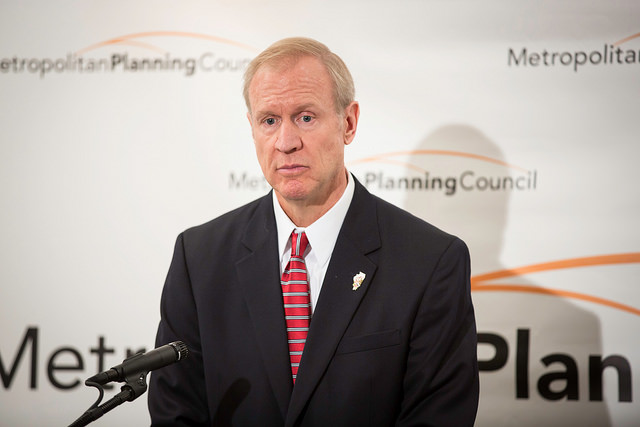Governor Rauner Blacked Out 150 Appointments On Official Schedule
By Jim Bochnowski in News on Jun 11, 2015 8:20PM
Governor Bruce Rauner, champion of transparency and efficient government, has apparently censored at least 150 appointments on his official schedule.
Following repeated requests for copies of Gov. Rauner's public schedule under the Freedom of Information Act, the Chicago Reader finally received a copy. The results were not exactly what the reporters expected, as they were sent a heavily redacted version of the governor's schedule from inauguration day through the end of April with more than 150 individual appointments blacked out.
When the Reader pushed back on the governor's staff, they were told by Associate General Counsel to the Governor Donovan Borvan that the redacted events were covered by two general loopholes in the FOIA law: one which exempts "preliminary" records and another which allows governments to withhold documents protected by attorney-client privilege. The Reader, doing their due diligence, asked how these provisions applied, but did not receive a response from Gov. Rauner's staff.
The Governor is currently pushing his "Illinois Turnaround" agenda, which has been more or less boiled down to being anti-union and pro-spending cuts. Interestingly, Rauner's schedule lists meetings between him and various elected officials to discuss his agenda, as well as members of the press. Which leads one to wonder what, exactly, is so important about these meetings that they had to be redacted from the copy of the schedule.
One of Gov. Rauner's first acts in office was to sign an executive order which publicly listed the state's political hires on the Illinois Transparency and Accountability Portal website. In a statement at the time of the signing, he said:
"The IDOT hiring scandal proved the public deserves a way to easily find out who are all the political appointees in state government. We need to restore faith in state government if we expect the people of Illinois to help the government in its mission. This Executive Order is a first step towards earning back the people's trust. Taxpayers at every level of government deserve to know more about how their money is being spent. The action we are taking today will help build a more open and accountable government."
In six short months, we've gone from Illinois residents deserving to know more about what their government is doing to the state denying our ability to know what the chief executive is up to. What could be on tap for the next six months?
